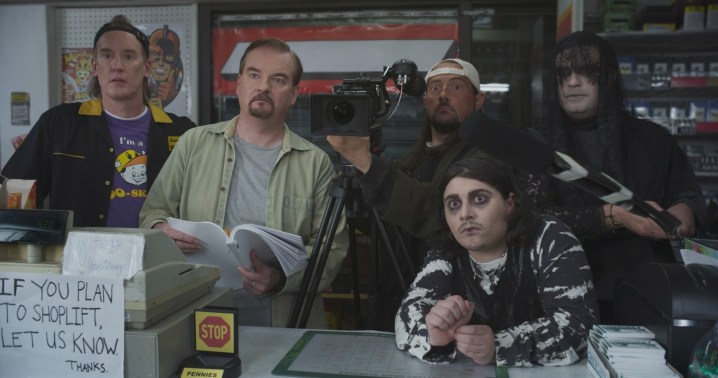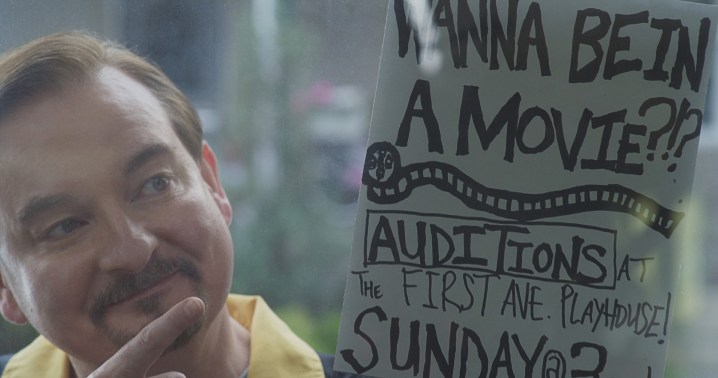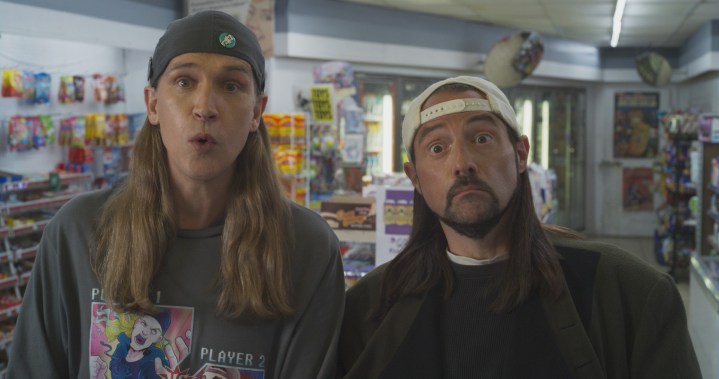At no point in the lead-up to seeing Clerks III did I expect filmmaker Kevin Smith’s latest movie to take me on an emotional journey that would leave me wistfully pondering the last 27 years of my life. And yet, halfway through the film, there I was, wiping tears from my eyes between all the dick jokes and celebrity cameos.
The conclusion of a trilogy that began with 1994’s Clerks and resides within the larger, loosely connected View Askewniverse, Clerks III feels like Smith’s most personal, profound project so far. Not only does it manage to recapture much of what made Clerks resonate with a generation of film audiences more than two decades earlier, but it does so with a surprisingly heartfelt assessment of the myriad experiences — both funny and tragic — that can make those years fly by.

All together now
Clerks III finds the trilogy’s co-stars, Brian O’Halloran and Jeff Anderson, reprising their roles as slacker pals Dante and Randal, respectively. After Clerks II concluded with them buying the convenience store and video-rental shop they worked at in the first film, the pair now find themselves falling back into the same old routine with the same quirky customers and snarky conversations about movies, TV, and life.
That routine is upended when Randal suffers a heart attack, and his near-death experience prompts him to finally make a movie of his own instead of obsessively discussing other people’s films. He convinces Dante to help him, and the pair set out to make a movie about his life — one that becomes increasingly familiar (to the audience, at least) as it morphs into, well … Clerks.
Once Randal decides to cast Dante and himself in the lead roles, the film-within-a-film brings back many of the original Clerks cast members to recreate the roles they played in the 1994 film, while also squeezing in cameos from Ben Affleck, Justin Long, and other cast members from Smith’s prior projects.
All of that self-referential material delivers a nice callback to Clerks and Smith’s oeuvre that’s entertaining on its own, but it plays second fiddle to the film’s surprisingly powerful dramatic arc.

Right in the feels
Although Clerks III delivers plenty of the irreverent, low-brow humor and biting commentary that Smith’s films do so well, it also provides some impressive moments of raw, real emotion.
Throughout the Clerks films, Dante’s narrative has always been a parade of awkward, unfortunate decisions — generally due to his own insecurities or Randal’s destructive influence — but Clerks III has him dealing with genuine, heartbreaking tragedy on top of the usual trials and tribulations. O’Halloran’s character began as a stand-in for Smith himself, who made Clerks as a somewhat autobiographical account of his own experiences working at a New Jersey convenience store (his film was originally called Inconvenience — a title the Clerks III characters ridicule in another recurring in-joke). O’Halloran made the character his own through his performances in Clerks and Clerks II, but Clerks III swings the art-imitating-life pendulum back to Smith, who had his own medical emergency in recent years.

Clerks III feels like a journey through Smith’s own, life-changing ordeal and a snapshot of how such an experience can bring your own mortality and the sum of your life into sharper focus — for you and those closest to you. Conveying that sort of existential crisis is no easy ask of any actor, but the pair handle it amazingly well, with Anderson exploring it through Randal’s cynical narcissism and O’Halloran through Dante’s rampant insecurity.
The film asks even more of O’Halloran, though, as Clerks III finds Dante already struggling to cope with a horrible tragedy before he faces the possibility of losing Randal, too. O’Halloran rises to the occasion and delivers what could arguably be one of the strongest performances by any actor in Smith’s films to date, wringing every ounce of pathos from Dante’s emotional journey. In doing so, O’Halloran and Smith transform a private ordeal into something achingly familiar, and let Dante channel the regrets, doubts, and frustrations we all keep bottled up in one way or another.

Wherever you go, there you are
How much you find yourself relating to the journey Dante, Randal, and the Clerks characters take over the course of all three films will certainly vary, perhaps depending on where you are in your own life. It could also depend on where you were at various points, too.
I was working at a video store in a strip mall in Rotterdam, N.Y., in the mid-1990s when Clerks was first released. I certainly wasn’t alone in feeling like Smith’s film encapsulated the life I knew — right down to the weekly street hockey games we played in a parking lot. But that was the magic of the moment in time Smith captured in Clerks: It made a wide swath of people who felt disconnected in one way or another feel seen and connected in unexpected ways.
And like Smith and the Clerks characters, we’ve all been through a lot in the last few decades. Joys, tragedies, hopes, and regrets have a way of piling up, and change is inevitable, no matter how hard we resist it. Clerks wraps things up for its saga’s characters with a satisfying blend of self-awareness and narrative thread-tying, but it does something even more impressive by letting the story go where it needs to go in order for fans of the original film to connect with those characters again.
I certainly didn’t expect to be wiping my eyes when the credits rolled on Clerks III, but I’m happy it happened, because it means Dante and Randal’s story is ending in a place just as personal and familiar as where it began.
Written and directed by Kevin Smith and released by Lionsgate and Fathom Events, Clerks III is available in theaters September 13-18.



